East Glacier to Lincoln

June 20, 2005
I felt better than I had in quite a while when I woke this morning. I went to ogle the pretty waitress once again, tried calling my mother (forgot to do this when I was in Calgary), and decided not to call home. I just didn't want to. I was in a powerful mood and wanted, needed, to keep this going. Blister and I went to the post office to take care of our respective chores and then parted. I was sad to be leaving her, for her to be leaving me, but the Trail takes people in different directions. We'd see each other again. I shouldered my heavy pack (eight days of food) and hiked out of town under spectacular blue skies. It was easy to hike when the weather was this good, and the spirit was this willing.

The first few miles from town were not in the park, but rather on Blackfoot land, and the trail was really just an old jeep road that happened to lead to the boundary of Glacier National Park. It didn't matter. The flowers were out and the mountains could be see. And it wasn't raining on me. And I was happy to be here. That was the important point.

The big mountains in Glacier were north of me, and I was glad that they were. I wanted pleasant forest walking for a bit, rather than an epic alpine adventure. After fording a creek (ok, I fell in), the trail wound through pleasant meadows, and a lot of mud. This didn't bother me. Nothing could touch me today. I ran into Leslie, Dave, David, and Nomad, who were slackpacking north from Marias Pass back to East Glacier. I wished them well, chatted a bit, then took off once more. The land was mellow, but expansive in its views. When I was in Glacier, I felt trapped by the mountains. They were an obstacle to be pushed through, not something to be enjoyed. The openness of the terrain and the non-confrontational hiking, plus the boost of coming out of town, all added to my mood, one thing building on another. A cascade effect.
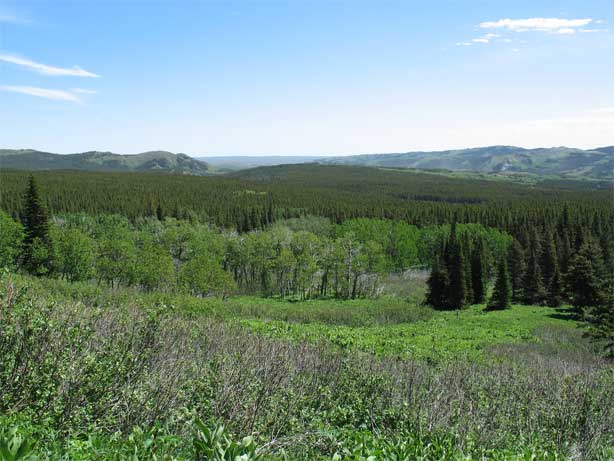
Nearing Marias Pass, I ran into three elderly day hikers who pointed out a moose to me in a far pond. I suspect that these are the last hikers I'll be seeing for quite a while, at least until I run down Buck-30 and Lisa, who have a day and a half head start on me. The trail south of Marias Pass does not cut a road for something like 130 miles, and even that is just a gravel road leading 30 miles out to the hamlet of Augusta. I won't hit a paved road until Rogers Pass, another 60 miles from the Augusta track. The mountains of the Bob Marshall and Scapegoat Wildernesses are not the huge draws that the ones in Glacier are. The attraction, at least for me, was the solitary aspect of the land. The fact that one can still get so far away from civilization.
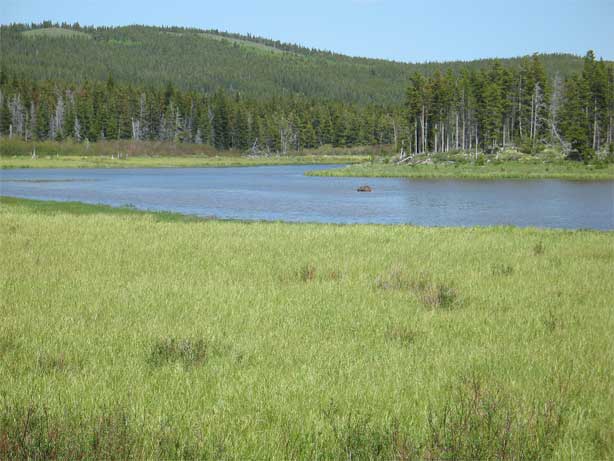
I walked across the highway and immediately began climbing a steep jeep road leading to a split in the CDT. There were two options. The right track, and the official one, takes one bumping up and down on a, perhaps, barely maintained trail. The left one drops down and follows an old road along the South Fork of the Two Medicine River. I like walking along rivers and bypassed the trail junction with barely a thought. I forded the river after dropping down into its drainage and walked with grace.
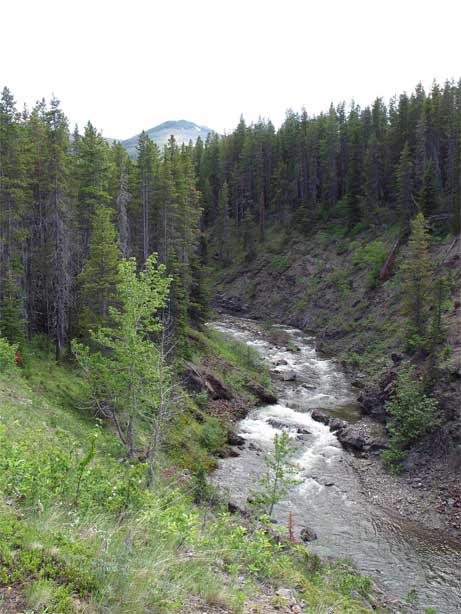
This was it, I thought. The reason I do these things. When everything lines up, mind, body, spirit, the result is a magical thing. People get to this in many different ways. I walked to find it, or for it to find me. I stopped to make dinner alongside the banks of the river and started pondering where I would spend the night. Another joy, a legitimate one, of long distance hiking is not knowing where you'll spend each night: Just walk until you are tired, or see a particularly fun place, and stop there. Two hours after dinner, I found my place in a pretty meadow by the banks of White Rock Creek.
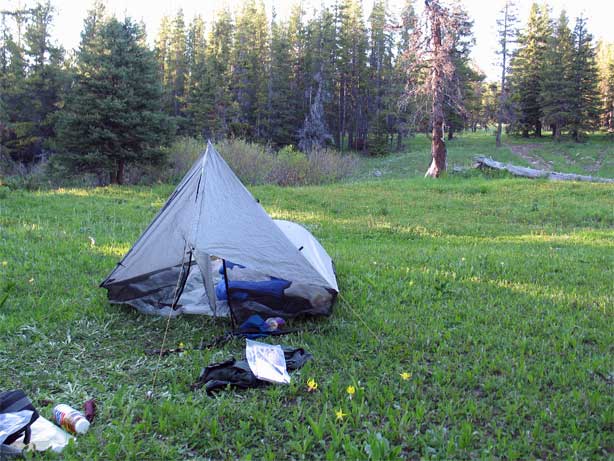
I pitched the tarp and threw a bear line for my food, then lazed about in the sunshine and flowers, eating Fig Newtons and writing in my journal. I couldn't believe how happy I was after so much misery at the start of the trip, so much pain, so much that I do not like to experience. Life was fun again.
My subconscious decided things were not right the way they were when I went to sleep and tortured me with a terrible dream about a part of my former life that I had hoped I had left behind in East Glacier. I had not. I had only forgotten about it for a bit. The grey silnylon over my head didn't help matters. I declined to make tea in the morning, despite knowing that the caffeine in it would help me feel better. I just wanted things to be like they were yesterday. How they could be. How they should be. I was unaligned once more.

At least it was sunny out and the trail easy, for now at least. I entered the Bob Marshall wilderness, although the sign marking the boundary was shattered into small pieces and laying on the ground. The trail disappeared and I had to walk through boggy meadows, searching for the trail. I finally found it by getting completely lost and turning up a trail in the wrong direction. I realized my mistake in direction when I saw the bog in which I had originally become lost. Mud, mud, and more mud guided my way up to Badger Pass, where was surprised to find three climbers encamped.

The other side of Badger Pass seemed to hold less mud, but this was only a temporary reprieve from the experience that gives the Bob Marshall its alternate name, "The Bog." My mind wouldn't let me go. It wouldn't let me enjoy this place, this time, as it had work to do. Solitude can be a glorious thing. It can also rip you apart. With no one around for distraction, my mind turned inward upon itself. My life was exposed in its entirety, and solitude does not allow one to lie to oneself. I was dissatisfied with how things had been of late. A door had been open before I left and I liked what I saw on the otherside. Things that I had not seen for a long time, or perhaps ever, were there. And then the door was closed and out here I had no key to re-open it.
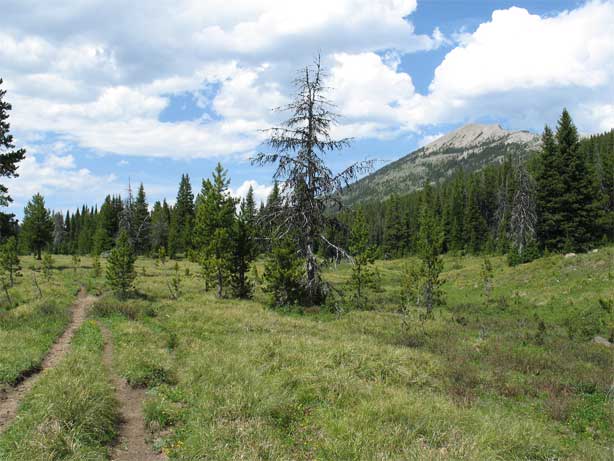
What would I give up to have the key, I thought to myself. Would I end this life of wandering and adventure and become domestic? In Steppenwolfe, Hesse describes a man torn between being a wolf of the Steppes and secure middle class properness, a man who, through his desire for solitude and thought, achieved exactly that. Society ignored him. He grew apart from others, even those that might be termed friends. The man had nothing but his mind to interact with, and then even that was lost. It was a book that enthralled me the first time I read it, and scared me when I re-read it two weeks before leaving town. I finished it just before that Day. Could I actually live a middle class life and do middle class things. Was that the price of the key?
It was raining on me. In my gloomy mood (not even dinner cheered me), I actually liked the rain. Not for cooling properties, but because it sent my spirits even lower. Walking through the rain and moping about closed doors and things that I didn't have, and might never will, I knew that I didn't want to be the Steppenwolfe, but neither did I want to sacrifice quality for security. I wanted freedom, but wanted people to share it with. I wanted everything. The rain ceased at some point and I sat down under a tree where it was still dry, thinking about not thinking. I desperately wanted to turn my mind off for a while, to lose myself in something, anything. There was nowhere to run to, nowhere to hide.
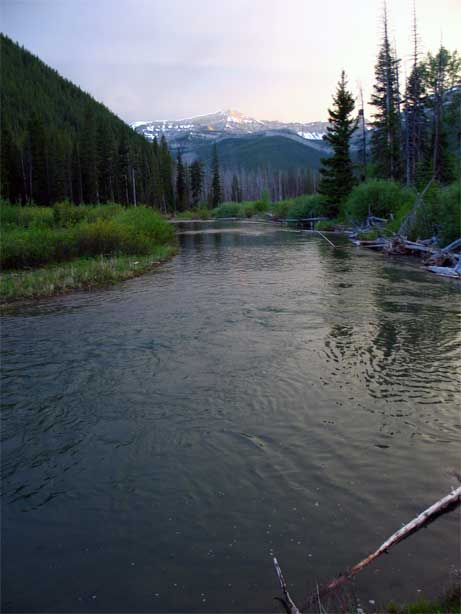
I was alone with myself and nothing could be done about that. I walked. Detouring away from the CDT to take a shorter, and hopefully more scenic, route, I hiked along to Gooseberry Park, where I found a nice ranger cabin, which had no one staying there. It would have been more trouble than it was worth to break in, so I simply set up my ground cloth and sleeping pad on the covered porch. Although I had walked 30 miles today, I wasn't especially tired, at least physically. I was, however, very weary. I went and sat by the river and watched the sun dance on the mountains in the distance. Mountains I would have to deal with tomorrow. Obstacles, not opportunities. Thunder banged in the distance. A storm was coming.
More blue skies in the morning, which was the best part of my waking up. I declined tea once again and waded across the two channels of the river in front of the cabin. Bitterly cold, but not very fast. I felt better than I had the previous morning and the physical exertion of climbing up into the subalpine, toward Switchback Pass, did me good. The trail took me out of the trees and alongside a steep mountain wall, heading toward the small pass in the mountains in the distance.

I began to tire quickly, unfortunately. After two hours and a good rest break, my body was not cooperating. My body was not because my mind was not. They were not playing well with me because I wanted to be somewhere else, to be doing other things, like buying groceries or napping on a futon. The trail bounced up and down and I had frequent snow to deal with. Snow that is soft enough to punch through, sometimes unexpectedly, makes for difficult, arduous travel. Difficulty can be handled, indeed enjoyed, when everything is aligned, when you are committed, when you are doing exactly what you want to be doing. I was not and the difficult sections of trail seemed insurmountable obstacles. Even Dean Lake, a stunning alpine tarn, barely registered with me. "Too cold to swim in," I said to myself, rather than something like, "Ah! What a spectacle!"

I had been able to follow, at times, a set of day old tracks through the snow (must be Buck-30 and Lisa), but they faded out after Dean Lake, leaving me with no trail and only a map and a compass and a barely functioning Self to help me find my way through. I came out to an overlook and spotted a creek below me, near which the trail was supposed to run. The view from the overlook should have prompted me sit down and rest, to enjoy this bit of America. Instead I dropped down cross country to the creek, forded it, and went looking for the trail. I just wanted to get through.

Not finding a trail, I followed the creek up toward its source, which was supposed to be near Switchback Pass, my gateway south. Taking to snow, I climbed higher and higher, but still no obvious pass came into view. I was heading toward the steep walls of a cirque, over which I would not be able to climb without a rope and several partners. I dropped into rest-step mode in the snow. Chant, breathe, step. Repeat ad infinitum. Tracks. Tracks came in and went up. Assuming that Buck-30 and Lisa knew better than I, followed them up higher, and finally saw the pass. Hidden behind a prominent bit of rock jutting out from the wall, it was a pass that could not be seen, from this side at least, until one was almost on top of it.

I almost fell over at the top, so tired and weary was I. I had been hiking for 5.5 hours and had only covered 11 miles. I wanted a helicopter to come and take me away from this beautiful land that I was privileged enough to be able to spend time in. I wanted everything to end. Maybe to get hurt and have to hike back to Marias Pass. No one was coming for me. I was alone and lonely. I walked on in a funk, trying to ignore what was around me, but really wanting to ignore what was inside of me. Solitude does not allow that. It is what drives confined prisoners insane.
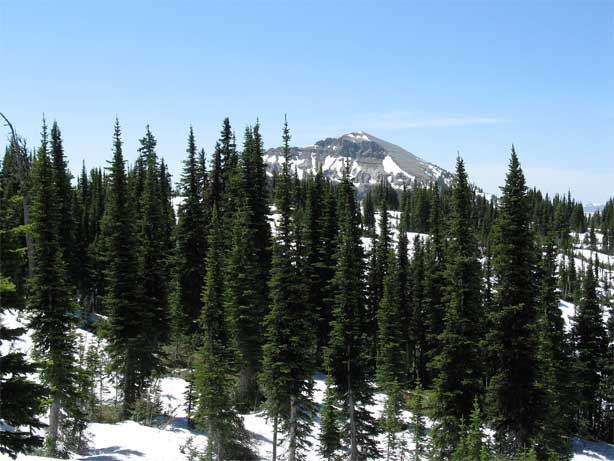
I reached a guard station at Pentagon Creek, but found it empty. As I cooked dinner I asked myself the terrible question that all long distance hikers need to ask themselves periodically. "If I could be anywhere, doing anything, right now, where and what would it be?" The answer was as easy as it was painful. I just wanted the summer to end so that I could go home and sort things out there. Even more depressed after dinner, I slogged up the trail. Despite the early hour of 6:30, I found a good campsite by the river and ended the day a few miles short of Spotted Bear Pass. One of the three fundamental rules of long distance hiking is, "If you're not enjoying yourself, you're doing something wrong." I needed a change, so I stopped early. I had to re-focus on my trip. What I wanted out of it. Live in the present and do not worry about things you cannot change. All the standard platitudes. Just as meaningless as before. But stopping early and leaning against a tree for two hours brought me some measure of peace. The most curious thing to me, and I went to sleep with it, was the question of why I had to wait for the summer to end in order to go home. What it said about me, I did not like, but knew that I had to understand this thing at some point. I needed clarity. Just as the only person who would bring me through the wilderness was with me, so too was I the only person capable of giving me clarity.
It was too cold to think in the morning and the small batch of blue that I had woken with quickly disappeared. The wind blew through me and the steely skies had every indicator of rain. Not what I needed right now, but it was what I had. I thumped up the remaining miles to Spotted Bear Pass, then climbed steeply up the other side heading for the only scenic feature of the Bog: The Chinese Wall. The Wall was a long uplift of cliffs and was supposed to provide a scenic break from the forest marching of the rest of the wilderness. After two hours of hiking, I got my glimpse.
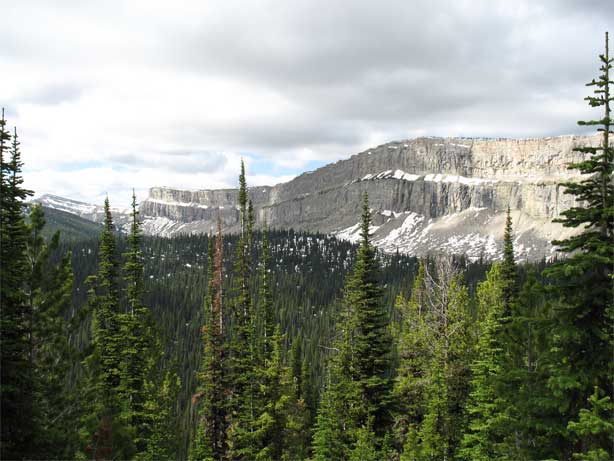
However, I was much happier to see Buck-30 and Lisa just breaking camp at My Lake than I was to see the Wall. I had met Buck-30 at the ADZPCTKOP in April and knew that he would be out here. I met both of them briefly in East Glacier just as they were heading out of town and I was surprised to find them so soon. I needed others at this point in my hike. I needed to latch on to someone stronger and gain something that I was lacking. I hated when people did this to me, but I was desperate. We talked and hiked and took turns breaking trail through the snow. When we lost our way, we split up and looked for the trail. We functioned well together, experienced long distance hikers knowing what has to be done and taking the time to do it. I forgot about my woes and enjoyed the time we had together. Even the weather, much to our collective surprise, cooperated as it cleared and became pleasant once again.
While the Chinese Wall was impressive in relation to what I had hiked through so far, I was disappointed in it. Anyone who has spent time in the innards of the Grand Canyon will understand this. It was a minor disturbance in the earth and was slate grey to boot, with only patches of white snow and bits of rubble to break up the grey monotony.
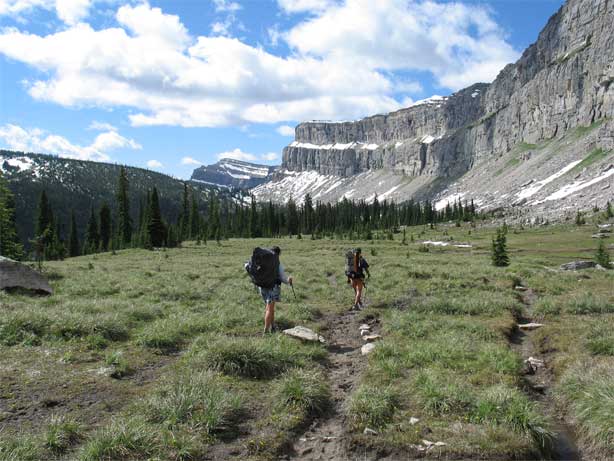
The views off into the distance were, however, much better. They gave a good indication at just how far from anything we were. No roads, no clear cuts, no cell towers. A vast land that has seen minimal intrusion. Except from horses and horse packing groups.
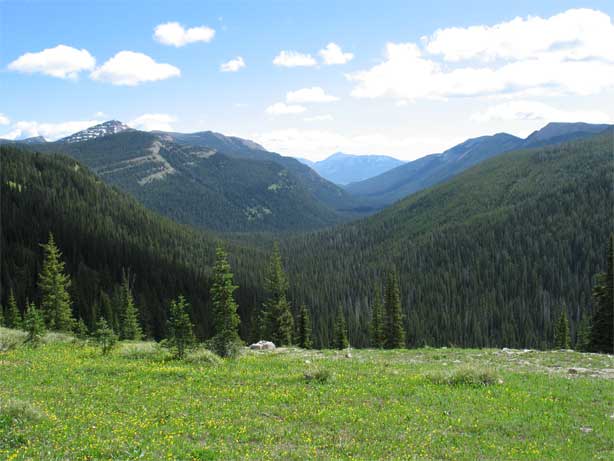
The trails along the base of the Chinese Wall, and there were many, were destroyed beyond belief by the pack trains. Mud bogs stretched everywhere, and there were enough lanes for each of us to have our own trail. To take a break, we had to search out and find a large rock to sit on in order to stay out of the mud. One can build a horse-resistant trail, but it takes work and effort and money and time, and those are things that the US Forest Service seems to lack, in this area at least. Most good horse trails get built by volunteers from horsepacking groups. Indeed, such groups maintain much of the PCT, particularly in areas that are not sexy enough for hiker groups to care about.

After a long break in the sun, we resumed our trek along the Chinese Wall, talking constantly. I wanted to get to know Buck-30 and Lisa well enough, quickly enough, in order to ask them the big questions. I needed someone like Blister around and Buck-30 and Lisa were the only ones. Unfortunately, our paths were going to diverge tomorrow morning when they would hitch hike down the lonely road to Augusta. I knew that three more hikers were in front of me, but I especially wanted a woman's opinion on things and the three up ahead were all men, unless Mark was short for Marcella.

Cresting out on the last ridge before leaving the Chinese Wall, I knew that I didn't have nearly enough time to leach from them those things that I needed. As we dropped down toward the forest, we began to separate, as hikers frequently do, with each proceeding at their own pace through dull sections. The gratuitous switchbacks meant that it took a long time to descend to the forest proper. I found Buck-30 snoozing on the other side of a river ford. I joined him to rest for a while and wait for Lisa, who was behind us.

I remembered my own experience on the PCT and decided that I could not and should not try to gain from Buck-30 and Lisa what I could not, seemingly, supply for myself. I would have to try harder. When Lisa arrived, I took off, sure that I would see them again. Rolling through the forest was pleasant and I found myself almost enjoying the walk through the lodgepoles.

The horse-caused mud bogs continued through the forest, keeping my feet wet and dirty despite my best efforts. Worse than anything I'd encountered hiking before, I almost concluded a that a limitation on horse entry into the area would be a wise thing. Almost, but not quite. People need to get into a wilderness from time to time, the more the better. The more people, the better. Without knowing, really knowing, why wilderness is important, people will bend and break when it comes time to preserve it. In order to understand wilderness, you have to go out into it. Theoretical knowledge gained from reading Abbey or Thoreau or the Sierra Club magazine is not sufficient. Horse groups, hunting organizations, and fishing guides have been amongst the most powerful of lobbies for protecting lands in the recent years. They have succeeded where more traditional environmental groups have failed because they have access to the federal government. Logging, mining, and damming destroy the lands they love and use to make a living. No, limiting access is not the reason. I can live with mud bogs if it means more people are on their way to the wilds.
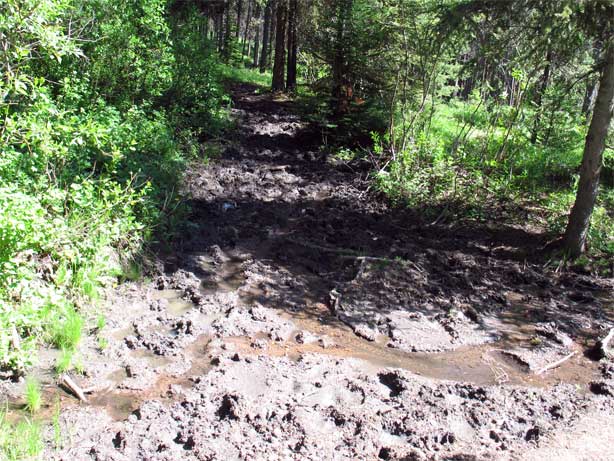
I stopped to eat dinner at a ranger cabin and even met a ranger there. He was packing in supplies just as I was leaving and mentioned the other hikers in Benchmark, near the road to Augusta. He seemed incredulous that anyone would want to walk across the country and kept asking me if I had a rig at Benchmark. I assured him that I did not and set out on the trail once again, riding the wave of contentment that I had had since running into Buck-30 and Lisa. The trail left the forest for a delightful series of open meadows, with many lanes, complete with such oddities as Aspen trees. I had seen lodgepole pines almost exclusively. Lodgepoles are plain. Aspens are pretty. Maybe I was just happy.
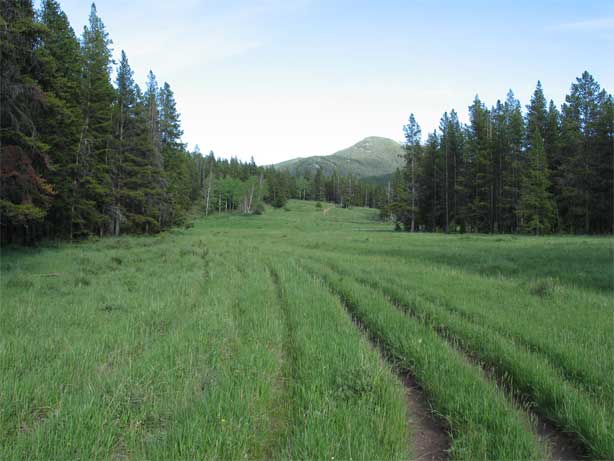
I ran into my friends as they were eating dinner by the side of the trail and stopped to chat briefly. Not much had happened to them in the few hours we were apart, as expected. Nothing ever happens quickly out here.
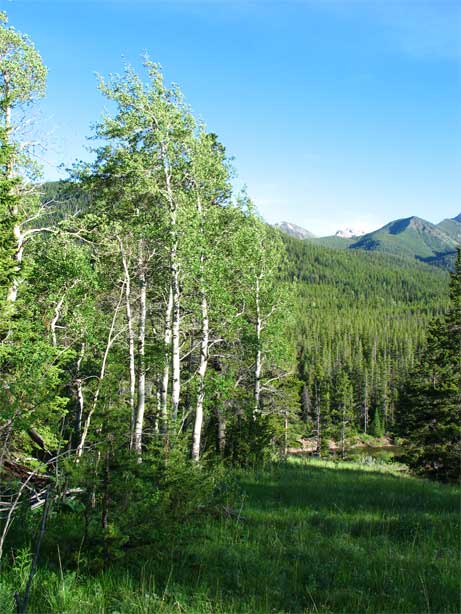
I hiked along and met a large group of Boy Scouts waiting for some of their friends that I had passed a ways back. They were excited to meet me and wanted to talk about gear and how to lighten their packs. Not exactly primo-conversation, but I needed human contact and was thriving off of it today. I spent twenty minutes with them revealing some of the standard tricks and then set out in the cool light of the early evening. Buck-30 and Lisa caught up to me as lounged by the side of a small trickle, bathing in the sun. I hadn't felt this good in several days and didn't want it to end.

I knew that with the end of the day, the morning was sure to follow and I rarely had a good morning these days. Buck-30 and Lisa would soon be gone and then I would have to face myself and my unaligned state would return. Around 8:30 we found a big, open meadow and called it good enough. I listened to Buck-30 and Lisa chat in their tent, two people sharing something of themselves with the other and gaining in return. I remembered what was on the other side of that, now closed, door and that I had to find the key, even if if was a key other than the one that I wanted. I looked up at the silnylon overhead and wondered if I had it in me to find it, to unlock the door once again. I wasn't sure.
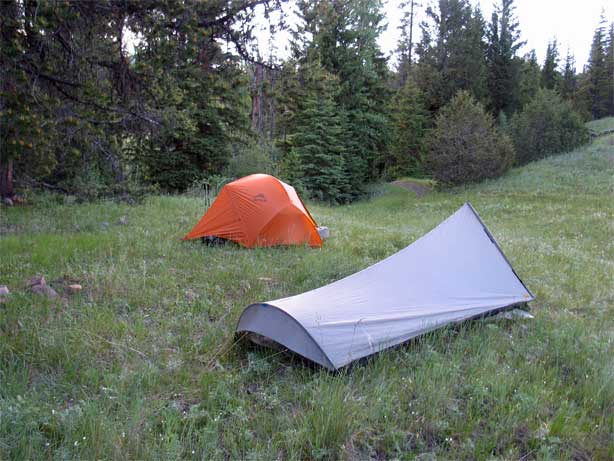
As I knew would happen, the morning saw my tarp weighing about twice its normal weight: Condensation everywhere, except near the foot of the tarp, where there was a thick layer of frost. It was very cold out and could I hear Buck-30 grumbling. I packed up quickly and we set off together; I didn't want not to miss any time with them. The stroll down to a bridge just before the Augusta road came too quickly for me, and I couldn't ask Buck-30 or Lisa any of the things that I wanted to. All I could get out was the ever present Why? Why leave a comfortable life in San Diego to come out here? Why put yourself through all this? No one, not even myself, has a good answer to this. Or maybe I've never heard one that is sufficient for me. Usually, the answer boils down to something like, "I just like being out here," or "You have to experience it to understand it." This last one is very true, but not very satisfactory to me. The first was perfectly valid as well, but I didn't want to be out here. Buck-30 did, and was happy. Lisa caught up and we parted ways at the road crossing.
Like an avalanche coming down, my mood fell almost instantly. There was nowhere to hide any more from the mirror of solitude, and I couldn't run away from myself. I sat at the Straight Creek trailhead, perhaps more miserable than usual. Buck-30 and Lisa had helped me a lot, though they didn't realize it. Three hikers were in front of me, but I wouldn't catch them today, I thought. I again asked myself the question, "If you could be anywhere right now, doing anything, where and what would they be?" I wanted to be shopping for clothes, or buying groceries, back at home with the person that had opened the door for me. I wanted to be domestic and properly middle class. I certainly didn't want to walk to Mexico. But, I had to walk somewhere. To Lincoln. I would go to Lincoln and then decide whether or not to continue on. There was no sense carrying on like this, in this place, at this time, in this state. I'd call home to see if anything had changed, though this seemed like an extraordinarily remote possibility. I had to try, though. If things had changed, then I'd leave. If not, I'd continue on. Maybe/ Why I insisted on continuing on bothered me.
The cold of the early morning was gone and I got up to walk a bit further south. I had a long forest crawl today to get in to place for an alpine, partly cross country, segment in the Scapegoat Wilderness. As most of tomorrow would be above treeline, I wanted to put in a long day so that I could avoid dealing with the afternoon storms that plague the Rockies. As I walked, one foot in front of the other, one step at a time, slowly gaining elevation, I began to feel better, more calm, less jumbled. Lodgepole forests have little charm, but the light coming through the canopy was appealing and cast interesting shadows, and those gave me some variety to ponder on.
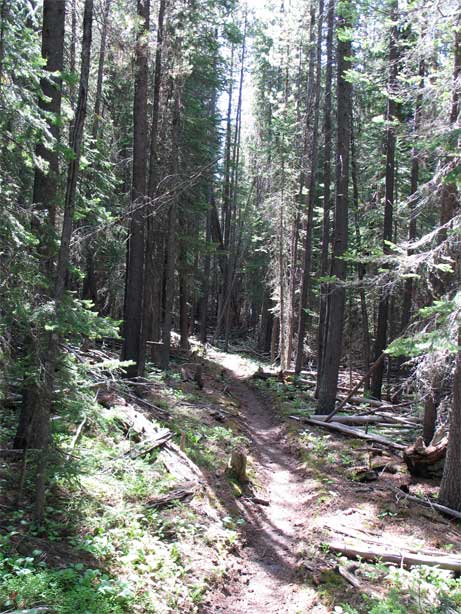
Having a plan and walking toward it helped immensely. Not thinking about how far it was to Mexico or about what was going on a thousand miles away put things in their proper perspective. I was just walking to Lincoln, and then would make a decision. The lodgepole forest ran out, sort of, as I neared Straight Creek Pass. An immense fire in the summer of 1988 (the same year that a third of Yellowstone burned in an unrelated fire) had engulfed the landscape on this side, and the other side, of the pass. The land was slowly recovering, but it had been a devastating fire. The lack of shade from a forest canopy brought out many wildflowers and smaller shrubs, while the beginnings of trees were popping up here and there. But it was the charred remains of the lodgepoles that was really stimulating, as they had burned into preternatural shapes and designs, which my imagination could play with. Adding to this was the expansive and open view in all directions that the lack of the forest gave to the land. Normally, one has to go into the alpine to get this. I was in a valley, and such views, especially at this elevation, are about as rare as finding an excellent chef in the middle of nowhere (though this happened with shocking regularity on the PCT in 2003).

I took a long rest in the shade of a burned out tree on top of the pass, drinking down the cold water that I had picked up at a small stream before the pass. The flowers were my only companions, but I didn't feel lonely, or alone, as I had for much of the summer so far. There was life all around me, so there was no reason to feel alone. That I hadn't felt this before today seemed improbable, why I hadn't a mystery. It was the same feeling that had driven me forward on the PCT with such a lust.

Properly rested, I dropped down the other side of the pass through more burned out forest and arrived at the Welcome Creek Guard Station, where I ate dinner on the porch. The option of continuing on south from Lincoln no longer seemed so terrible. Nor, however, did the option of going home. A few hours before one had dominated the other. Now, they seemed on equal footing. It irked me, slightly, that my decision would come down to some one else. At least both options seemed pleasant enough, for now.

I cruised along the trail, winding around and above a creek, all the way to a junction with a short cut to the alpine route for tomorrow. Although staying on my current trail was safe, solid, and sure to work, I decided to try the short cut instead and headed down to the crossing of Whitetail Creek. There was a large, organized hunting camp here, but no hunters or outfitters as hunting season was still some time off. I did, however, find Mark, Tommy, and Razzu sitting my the banks of the river finishing up dinner. They asked me, "Where is the CDT?" Puzzled, I pointed over my shoulder and said that it was about 50 yards behind me. I was surprised to find them here, as they had at least a day's head start on me from Benchmark. The reason, it turned out, was an errant short cut. They had thought they were in one place, when in fact they were in another. So, they left the trail I had hiked down over the last few hours too early and bushwhacked their way up the wrong drainage, thinking it led to the alpine route. They had spent most of the day being lost before finally returning to Whitetail Creek, where I met them. Tommy knew me from the PCT in 2003, but I didn't recall him. Apparently we met at Kennedy Meadows, where there was a large congregation of hikers waiting to enter the Sierra after finishing the Southern California section. He had followed my entries up the trail in various registers and I was sorry that I couldn't place him. I considered hiking another mile and a half with them to a different camp, but decided it was nice here and wasn't feeling especially needy. Besides, I'd see them tomorrow.
I found a cleared spot under a sheltering tree with plenty of duff for cushioning and threw a bear line over a conveniently rigged cross pole nearby. The route tomorrow sounded potentially challenging. Most of it was above treeline and some of it was cross country at high elevations. I'd have to actually use a map and compass, it seemed, especially if there was snow. And, given the high elevation, there had to be snow. There was no way around it, however. The thought that I'd cross the Scapegoat with three others gave me confidence, as four minds are usually better than one when it comes to such things. I put away the maps and ate some fig newtons, enjoying the pleasant weather and the time that I had. Having time was nice. I just wished that all the days could be like the latter half of today. For the moment, I was aligned and committed. I needed it to last for a while longer.
Grey skies in the morning turned to soft rain before I had even gotten much out of camp. After consulting my maps, I realized that I needed to head a bit further down the trail from yesterday before cutting over. I stopped to talk with a man and his dog just after fording Whitetail creek on the short cut, then bushwhacked a bit in between game trails and found Mark walking up the proper trail. He stayed behind to wait for Tommy and Razzu while I headed, slowly, up the trail, pleased that the weather seemed to be getting better. The trail climbed through a forest, switchbacking its way up to the crest and a final water source before beginning the cross country section. As I broke through the trees and fetched water, the three others caught up to me. All of us gazed at the horizon and my hopes for good weather were shattered. A storm was coming right at us.

For the moment, however, the weather was stable and I could always hope for the best. A rainbow broke out in the valley away from the storm. I should have stayed where it was sheltered and waited for the storm to pass. Being above treeline in a gale is one of the least pleasant experiences that one can have while hiking, but I forged on, cutting up the side of a hill on the cross country track.
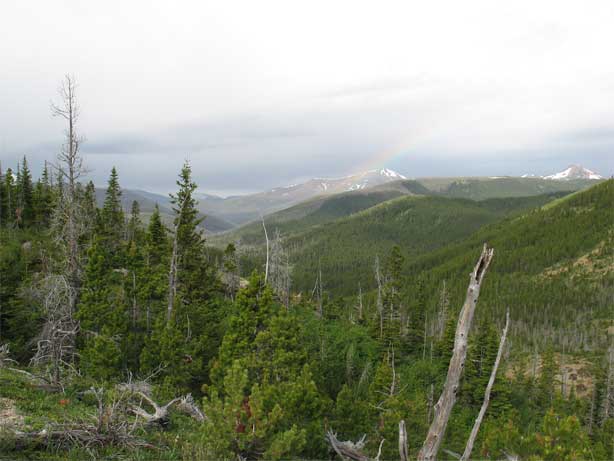
I climbed higher and higher on the hill, which was well marked by a few cairns and a noticeable boot track. Fire had scorched the area and it was bloody obvious where to go. Just as before cresting out, I noticed Razzu almost on my tail and was glad that I'd have some company in the upcoming storm. Some one to commiserate with. On top the ridgewalk spread out before me and I wondered why I had been worried about navigation in the first place. The fire had burned up what few trees stood in the alpine, which meant that the snow had long since melted. Just run the ridge. Despite standing and gawking for a few minutes, Razzu didn't show up. I set off along the ridge, watching the storm get closer and closer.

The ridge gave out eventually and I had to drop down into a basin, which was conveniently marked with cairns in places. When it wasn't, and when the boot track faded out, I used Jonathan Ley's map and the obvious landmarks to bring me across a meadow. Still, no Tommy, Mark, or Razzu, despite the frequent stops I made to make sure I was heading in the right direction. Perhaps they were waiting out the storm, as I should be doing. As I climbed up a gully, the storm hit with full force. High winds, driven rain, cold temperatures, but no lightning, for which I was thankful. My mood dropped as I thought about how beautiful this place would be in good weather, about how I would take a break at this beautiful notch, or that scenic overlook. Instead, fully geared up, I pinned my ears back and climbed higher and higher into the storm. Without the shelter of trees to break the wind, I was being thrashed hard and did not appreciate it very much.
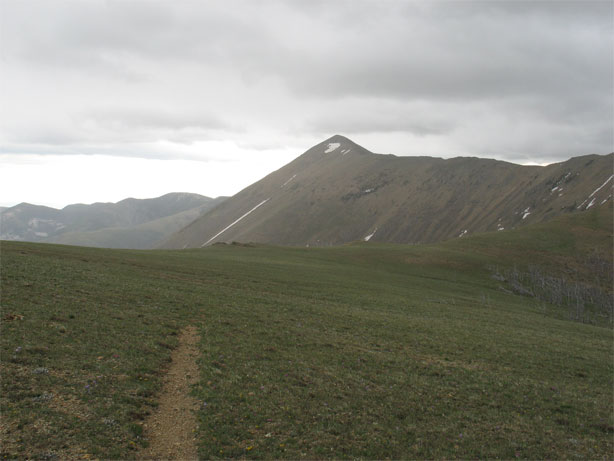
Higher I climbed, right into snow on the top of another ridgeline. I followed my way along the ridge in the snow, which actually afforded good footing for once. I sensed that I was heading in the wrong direction and pulled out Jonathan's map, which indicated a sharp left turn just after cresting out and held a written warning not to miss this intersection. I had, but not by much. I returned to a snowy basin a few yards behind me and went around the proper side of the mountain, hoping that the others would not get confused by my tracks. The storm pounded me and I could feel my body temperature dropping. I could not stop for fear of hypothermia and had to continue to hike on, despite my tired body. I wanted to be anywhere but here. Out of the storm and in safety. It didn't matter where. A few miles further up was a small valley where there would be some shelter from the storm and I could put up my tarp to ride out the storm in. I had realized, once again, that I really didn't want to die out here, particularly from something as preventable as hypothermia. I trudged on through the snow, following someone's tracks at times, generating the body heat necessary to sustain life. I thought again that I didn't want to die doing something that I hated, that made me miserable. Just like dying in an accident while driving to work at Wal-mart. And then, as I was pondering how long I could take the storm, it stopped abruptly. Most storms take their time in ending, but this one turned off like a light switch.

I could see the mountains again. The valleys were clear and the mist was gone, except for a few remnants hanging out. I had never seen a mountain storm end so quickly. The sun came out and shone on me, giving me some external warmth for once. I sat on a rock to rest in the limited sunshine and ate a King Size Snickers bar to stoke the metabolic fires inside.
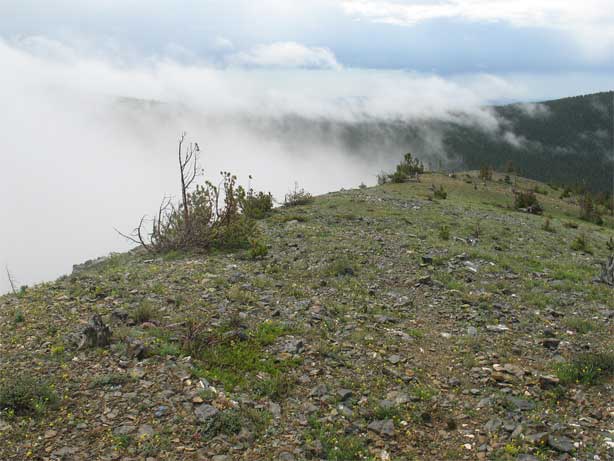
With the faded storm, my mood improved immensely. I was warm again and was no longer being pummeled by the high winds and rain. The danger from hypothermia had passed and I no longer had to hike simply for warmth. I could enjoy the land once again. I dropped down into the Valley of the Moon, its shelter no longer needed, and reminded myself not to make an alpine run in an oncoming storm again, at least not if I could help it.
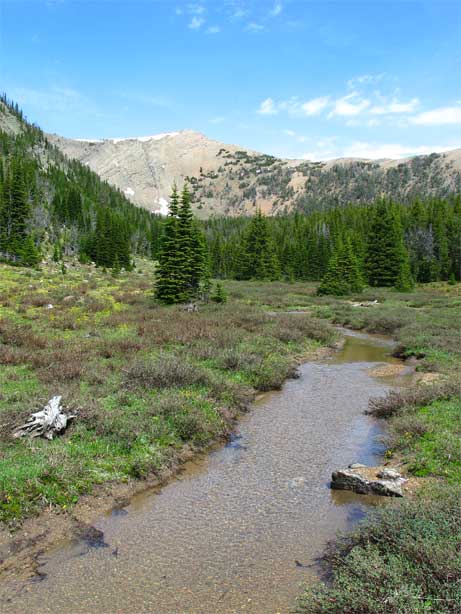
I took a little water from a stream in the valley and then headed up the other side of the valley, climbing back in to the alpine. Unfortunately, the way up was thickly wooded, and the shade that the forest provided meant that there was still much snow blanketing the trail. With each step I postholed to my knee, sometimes to my hip. Each step was physically tiring, damaging. My legs torqued and twisted, my lungs heaved, and the sweat flowed down my forehead, into my eyes. If someone had seen me, they would have thought I was crying. Unlike the snow on the ridgeline, this stuff was rotten and I was exhausting myself quickly. The effort ended only when the trail broke through the forest and back onto the open ridges above. No trees, no snow, and absolutely no navigational issues.
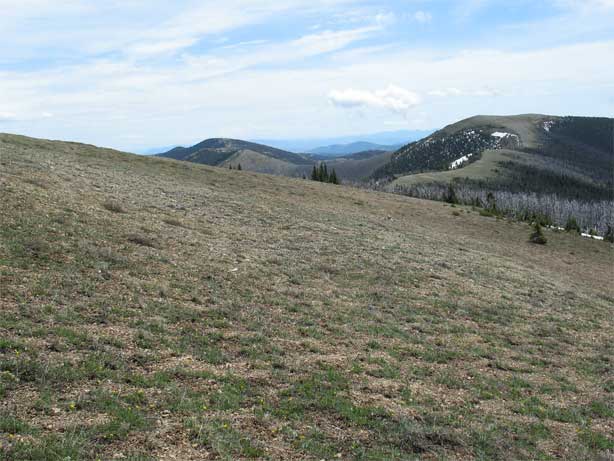
With the passing of the storm and the return of blue skies, I could enjoy this place, finally. A chill wind was blowing and I settled down in the lee of some bushes to take break after the effort of the climb. The world spread out around me, as it only can in the high alpine. Trails in such areas are rare. I could only think of a couple of long, alpine ridges that I had hiked using the convenience of a trail. I could only come up with two: the San Jacinto traverse and the Kennedy Canyon to Sonora Pass section, both on the PCT.
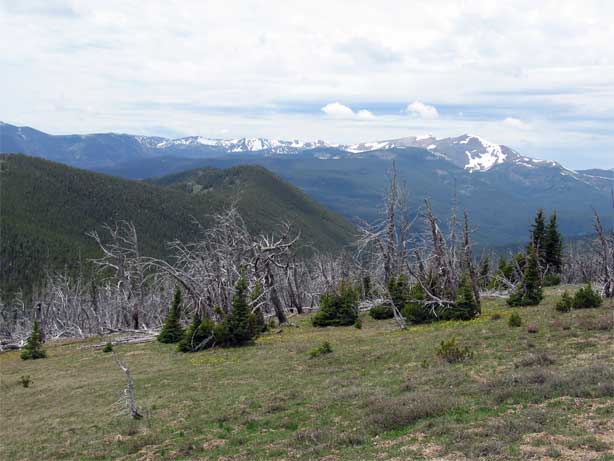
Sufficiently rested, I left the bushes and hiked along in an amazingly good mood. I was savoring the land for once. The path ahead of me no longer represented an obstacle. Rather, it was an opportunity and a blessing, something to be cherished and treasured. To the east the land became dry and eventually flattened to the plains that make up the vast majority of Montana.
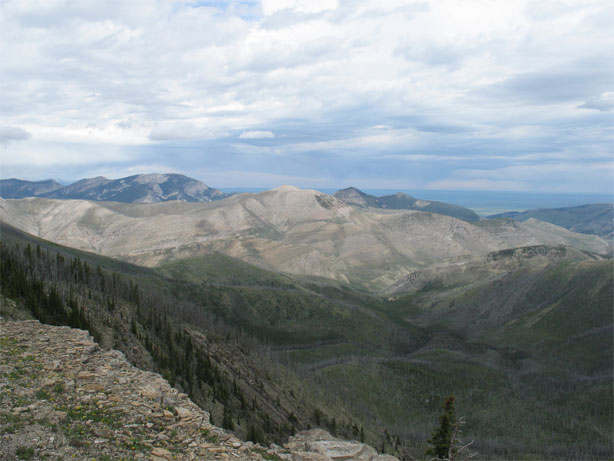
Looking south and west, the mountains were greener and occasionally snowy. I could see forever and imagined that this is how a bird must feel when it takes to wing. While the trail did fade in and out, it was almost superfluous. Just keep heading along the ridge. Drop down to a pass, climb up the other side.
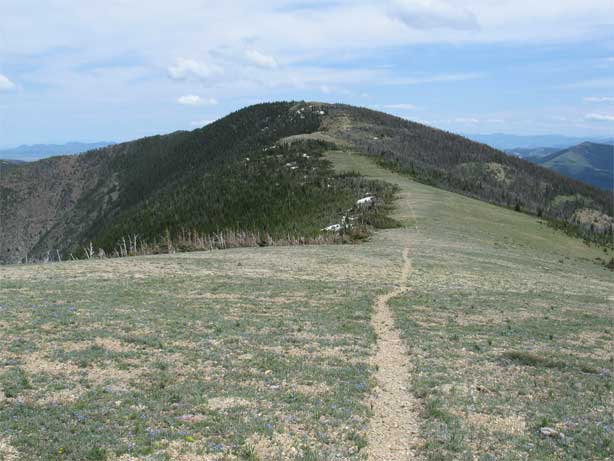
And through out there was nothing but 360 degree views. Mountains, valleys, rivers, plains. One thing piled up on another and I walked in, almost, a state of grace through the Scapegoat Wilderness.

On top of one particularly scenic knob, I stopped to rest and wait for the others, as surely they would catch me at my very slow pace. I drank down a liter of water and realized that I was rather short on that vital substance. One problem with long ridgewalks is that there is always a distinct lack of water. I hadn't carried enough out of the Valley of the Moon to make it through the rest of the day.
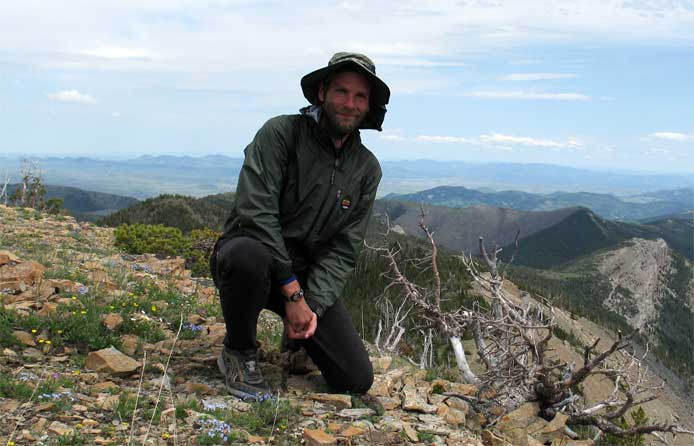
This wasn't much of problem, I decided. The storm that I had weathered seemed to be coming back for an encore. Looking to the west, I could see it forming and beginning to head my way. I had no desire to fight another storm and, after looking over my maps, decided that I'd simply head down to the Alice Creek trailhead, which was low and in the forest, and avoid the ridgeline, cross country route that Jonathan recommended.

I had, from the looks of the storm, an hour or two before it reached me and so could take the time to lounge and wait for the others. Sitting on the knob, with the world at my feet and pretty blue flowers all around, I had no desire to race off. It was pleasant now and Now was all that mattered to me. No thoughts of home or open doors or closed doors. I was comfortable in my skin and the torments of previous days seemed long vanquished and unimportant to boot. I hoped that today was the turning point in the summer. That with today I would be in alignment and be able to do this thing that I loved so much. That I sacrificed so much for. Had I not left town a few weeks ago, perhaps fragmentation would never have occurred. I knew this to be preposterous beyond belief, but I thought it anyways. And it did not bother me at all.
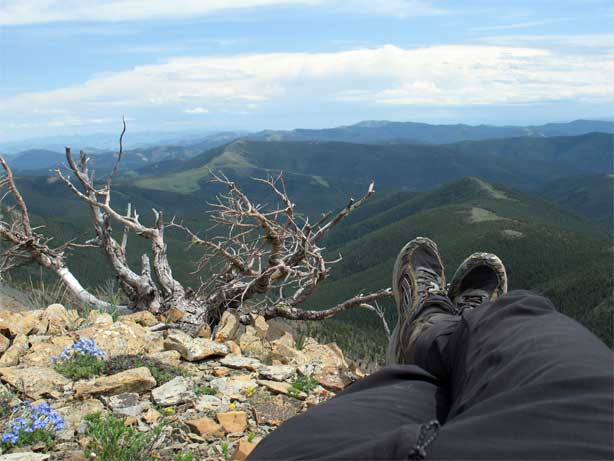
After nearly an hour on the knob the others were not here and the storm was much closer. I was out of water anyways. I set off and bounced through a bit of snow before regaining the trail, which plunged steeply down to an old jeep road that came up from Alice Creek to meet the trail. When the guidebook I was using was written, there was no trail along the crest to Lewis and Clark pass, which stood out in the distance. Now, however, I found a CDT sign pointing along the crest in the direction of the pass. I took one last look at the sky and began dropping down the old road.

Lewis and Clark pass is one of the more significant historical places along the CDT. When the explorers were returning from the Pacific, they split up to look into other routes through the Rockies that they had been told about. Lewis came this way, fought the Blackfeet, and made a very hasty retreat away from that nation. He came over the pass now named for him and his colleague (Clark was a hundred miles away) and dropped down into the plains.
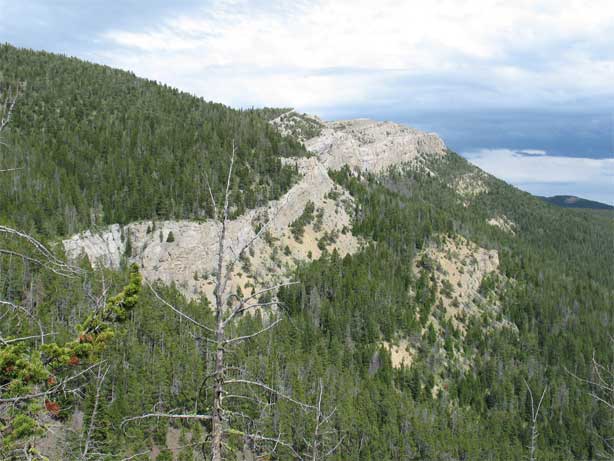
The descent down to Alice Creek was quick and well watered, allowing me to slake my thirst after the ridge on an ample supply of the precious stuff. The storm came, but I was safe in the trees and the worst that I got was a light sprinkling. It probably wasn't very bad up high, as the rain ended quickly. I came out onto a high standard gravel road which led into the trail head. Absolutely devoid of people, I had it and its pristine privy all to myself. No way I'd camp and get rained on, when I could have a shelter over my head.
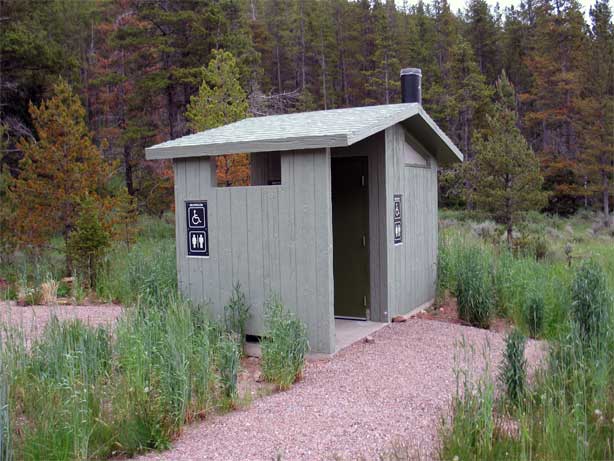
I cooked dinner on a picnic table nearby, though I had to retreat to the shelter of the privy's roof when rain returned. I ate and drank tea and rested under the small roof, safely out of the wind and wet. Surely the others would make it here tonight. Camping and water were scare along the ridge, although if they made it all the way to Lewis and Clark Pass, they might be able to get water there. Surely they'd do the smart thing and come down out of the storm [I later learned that they had intended to come down to Alice Creek, but passed by the old road. Apparently, the new CDT sign had confused them and they ended up putting in a long day all the way to Lewis and Clark Pass, where they camped.] The sky began to clear as night fell. I stayed up until 9:30 so that I could see a sunset and then arranged my room in the privy. Thankfully, it had been recently installed and didn't smell at all. Just large enough for me to stretch out in, it provided me with a bit of security and I knew I'd sleep well tonight. Assuming, of course, that no one showed up in the middle of the night looking to use an outhouse.
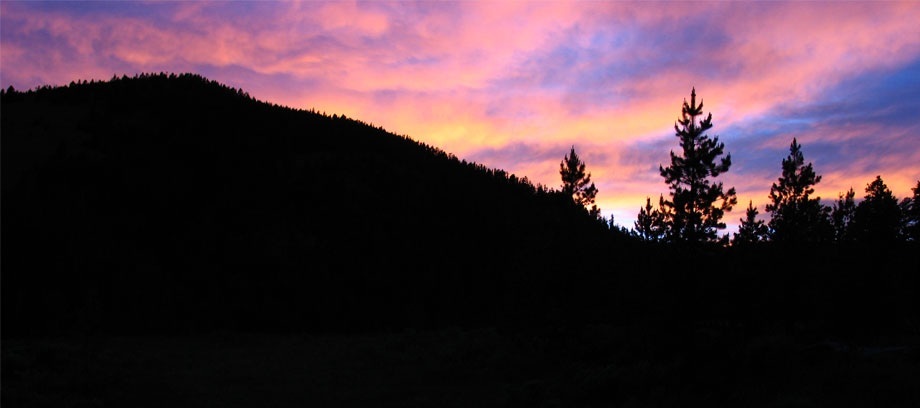
I slept well in the privy, safe from the winds and occasional rain that fell during the night. When I finally poked my head out to make tea, I saw nothing but low, ominous clouds. The high country up on the ridgeline would be unpleasant, to put it mildly. Rather than putting myself through it, I decided after tea to simply walk the gravel road to Montana 200, the highway that leads to Lincoln and the road I'd be hitching on anyways if I were to take the CDT to Rogers Pass. Not a terribly difficult decision to make.

I strolled down the gravel road and quickly left forest service land for private holdings, primarily cattle ranches. The walk to the highway took less than two hours and was actually rather pleasant: The green, pastoral land, with rounded, rather than sharp, mountains in the distance reminded me of the Appalachian Trail at its best. Rain fell occasionally, but there were plenty of large trees to shelter underneath until it passed, and I reached the highway feeling rather happy. And then I put my thumb out.
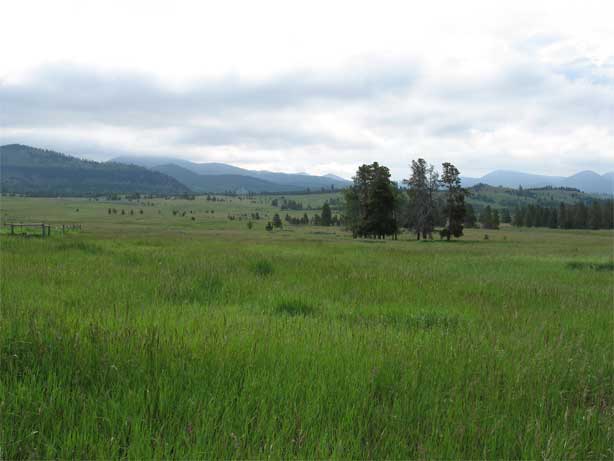
Hitchhiking is a hit-or-miss occupation. It requires patience and faith that someone will eventually stop. I estimated that it was nine miles into Lincoln, which meant a three hour walk. Or, someone could stop and give me a lift there in ten minutes. I waited. It began to rain. Cars flew by at 70 miles an hour. After forty minutes of standing in the rain, I hid under some trees to wait out the rain. I eventually returned to the road with my thumb out and watched the cars blaze by. Almost two hours after reaching the highway, I had barely had a sympathetic glance, let alone a ride. Frustrated and out of patience, I set off walking on the narrow shoulder road. I just couldn't stand the sense of rejection from the passing motorists, who whizzed by me in their cars and trucks and RVs. As I walked, my mood grew worse and worse. I was spending a few hours of my life walking along a crappy highway in the middle of nowhere Montana, because no one would stop to help me out. I could have ridden, easily, in the back of a pickup into town. I'd have sat in one of the boats being hauled. But nothing. I could be at home, doing something else, anything else. I wasn't spending my time doing anything enjoyable, only necessary.
After a few miles an ATV track running alongside the highway got me off the shoulder and, being separated from the multi-ton vehicles by more than a half a foot, I felt slightly better. But only slightly. I finally spotted the outskirts of Lincoln and took a break under the shade of a tree, for the clouds had left me and a strong sun was now beating down upon the road. Lincoln was a small town with not much to it. I crossed it in only a few minutes of walking. Although microscopic by vehicular standards, it was the perfect size for someone on foot. I found a room at the Blue Sky Motel for $32 a night, then went out to fetch some beer and a sandwich. Three 24 oz. cans of Miller Genuine Draft help numb the hurt that I was now feeling inside. The walk into town from the Alice Creek road wasn't the cause. Rather, now that I was in town I really felt lonely and isolated. Completely alone and cut off from the rest of humanity. As I watched families drive through town, or stop at the gas station, or buy food, my sense of rejection from the middle class life was overwhelming. I was an outsider, someone to be avoided at all costs. Someone that parents warn their children to stay away from. Obviously homeless, thickly bearded, dirty, smelly. If they could have seen me a month earlier, they would not have recognized me as the same person. With a half gallon of cheap beer inside me and glassy eyes, I stared for a while at the phone. I could call, I could try, I could find out. I showered instead.
The wall length mirror showed a clean, though sunburnt and scraggly man. I couldn see my ribs if I stretched in an awkward way. I stared at the phone again, but I just couldn't use it. Didn't want to. I couldn't call when I was like this. Besides, we never talked on Sundays. I was out of beer and it was time for dinner, which meant I had to put clothes on. My hiker clothes stunk far too much, so I put on my rain pants and thermal top and rainjacket, with its tiger strips of salt stains, and walked over to the Scapegoat Eatery. I ate a medium pizza, accompanied by a few beers, but I had to force myself to finish the pie. I had no trouble with the beer. My lack of an appetite disturbed me. I should have downed the pizza and then ordered a bacon double cheese burger and cheese sticks for a second course and then picked up a pint of ice cream for dessert. I just didn't feel like eating. No one was in the grill except for myself and the waitresses, who were not pretty enough to ogle, but sweet enough to talk to. They told me there was no bus service to Helena, or anywhere for that matter. I didn't know what I wanted to do. I had to do something else, something different. The cardinal rule, again. I paid and bought more beer at local grocery store and some raspberry zingers in case I got hungry later on.
In the motel room I swilled the beer and flipped through the channels on the television. I looked at the phone. I was too jumbled up inside to call, to talk. I had to talk to someone, though, so I called my mother and chatted with her. She could hear the hurt in my voice and that I was clearly not having a good time out here. I couldn't explain to her why this was so, what the source of my pain was. I hadn't told her anything of the Springtime and to explain now was more than I could do. Still, talking with her helped ease my sense of estrangement from the rest of the world and when I hung up I was able to watch the television without constantly changing the channels. But the hurt was still there, no matter how much yellow beer I poured into my body. I fell asleep with the lights on sometime after midnight.





















































